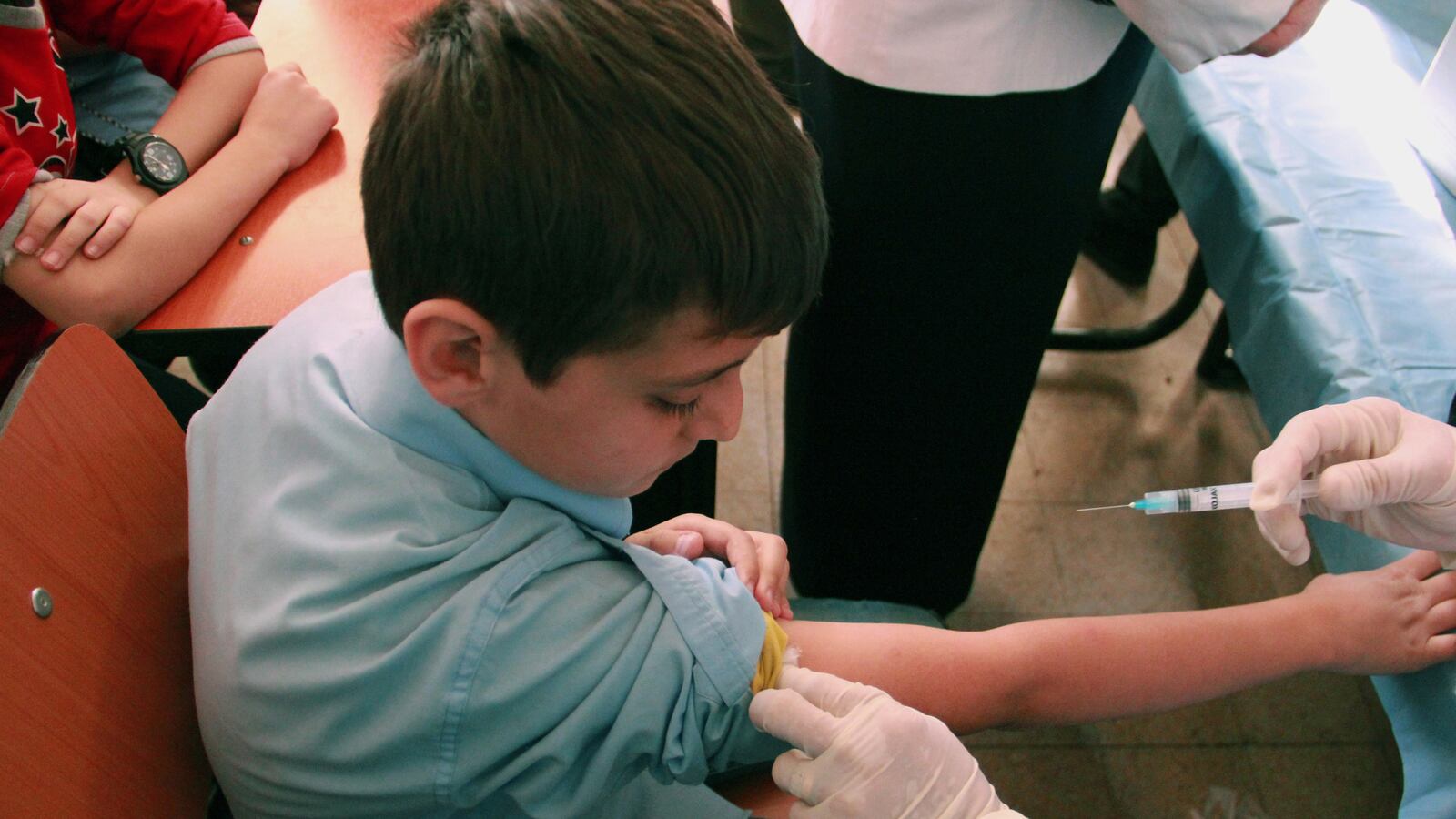The U.N. is preparing a huge region-wide polio vaccination campaign out of fear that the emergence of polio inside Syria is the beginning of a much larger epidemic.

The World Health Organization announced Tuesday that polio had appeared in Syria for the first time since 1999, prompting an effort last week to vaccinate 1.6 million children inside the country. Before the Syrian outbreak, experts thought polio had been eradicated in all countries except for Pakistan, Afghanistan, Somalia and Nigeria.
Ninette Kelley, the top representative for the U.N. High Commissioner for Refugees (UNHCR) in Lebanon, detailed the larger regional response to the outbreak on Wednesday in an interview with The Daily Beast.
“We’re taking it very seriously inside of Lebanon,” Kelley said. “The U.N. is now working with the [Lebanese] Ministry of Public Heath on a massive polio vaccination campaign… This new strategy has been mobilized within the last week.”
The U.N. and the Lebanese government are now in the process of setting up vaccination stations at all Lebanon-Syria border points and the campaign will include an effort to go house to house to vaccinate all children under the age of five, Kelley said. The campaign involves several international agencies, NGOs, and the Lebanese government.
In a multi-pronged effort inside Lebanon, UNICEF will procure the polio vaccines and support the Lebanese public health ministry in vaccinating Syrian children who are crossing the border or living in ad hoc refugee tent camps. The World Health Organization (WHO) will pay for the door-to-door vaccination program. The U.N. Relief and Works Agency will vaccinate all Palestinian refugee children in camps and gatherings. UNHCR will press refugee families to bring in their children for vaccination and deal with waste disposal and hygiene. WHO and UNICEF will also support an information campaign in health centers in the hopes of identifying polio cases early on.
According to The New York Times, similar efforts are underway in southern Turkey, Jordan, Israel, the Palestinian territories and Egypt, with over 10 million children expected to be vaccinated in the coming weeks.
The new polio vaccination campaign will further strain the already underfunded humanitarian and health resources for refugees in the countries neighboring Syria, Kelley said. Her organization pegged the need for refugee assistance funds in 2013 at $1.6 billion but only about $500 million was given, about half from the United States.
“We make very tragic choices daily against equally compelling needs,” she said. “Lebanon doesn’t have any infrastructure to handle a crisis of this scope.”
There are 800,000 Syrian refugees in Lebanon today and that number is expected to top 1 million by year’s end, making the refugee community more than 20 percent of the overall population. The Lebanese government doesn’t allow actual refugee camps, so over 100,000 Syrian refugees are living in “temporary tent settlements,” many of which have no sanitation and are vulnerable to flooding when winter sets in.
The polio outbreak is just the latest threat to the stability of countries like Lebanon as the Syrian civil war continues to spill across international borders and destabilize already fragile countries.
“The message is, ‘please help this country because they will not be able to cope and they are not stable to begin with,’” Kelley said. “The downside risk is the kind of violence you see in Syria erupting in Lebanon, either between the different groups in Lebanon or between the Lebanese and the Syrians there.
UNHCR is also spending money to upgrade Lebanese primary care facilities to deal with the flood of refugees and prevent them from becoming vulnerable to whatever epidemic might come next. Money is also being spent to expand Lebanon’s school capacity. Some 280,000 Syrian children want to attend public school in a Lebanese educational system that had only 300,000 Lebanese children as of last year
Antoine Chedid, the Lebanese ambassador in Washington, told a think tank audience on Tuesday that without more assistance, his government might be forced to close its border with Syria. The refugee crisis is “an existential problem for Lebanon,” he said.
Kelley said it’s also a problem for U.S. and Western power and influence in the region.
“There is a larger geopolitical interest here that goes beyond Lebanon,” she said. “They feel they’ve been a good friend to Western interests and they feel abandoned. The [Lebanese] Minister of Social Affairs said recently in Geneva, ‘You risk losing your friends in this region.’”
As for the polio outbreak inside Syria, the State Department said that Secretary of State John Kerry discussed the polio outbreak over the phone Wednesday with Russian Foreign Minister Sergei Lavrov and asked for Russia’s help in containing the crisis.
“The Secretary urged that the United States and Russia work in partnership to tackle this challenge, emphasizing that Russia can play an important role in encouraging the regime to allow humanitarian access and the delivery of essential aid,” said Spokeswoman Jen Psaki.





